Some friends of mine have got the new edition of
Mansions of Madness,
and I went along to try it out. Spoilers for the "Escape from
Innsmouth" scenario.
It's still one of the Fantasy Flight Cthulhu games, like
Eldritch Horror, Elder Sign and indeed Arkham Horror, and so we
get the same characters as usual.
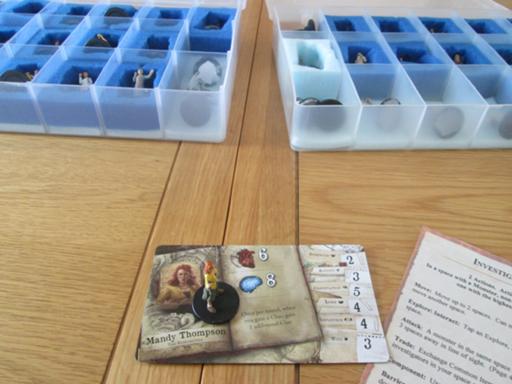
But instead of one player sitting out as GM, an app is required to run
the game. (This is compulsory: the full rules are not available. And
the app is closed-source and only runs on closed platforms.)
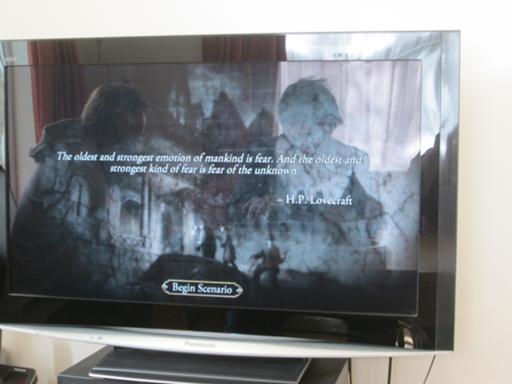
Clearly (if you know me) an app-based boardgame isn't something I
would ever buy: you can't modify the rules, and you can't expect to
get it off the shelf in ten or twenty years' time and still be able to
play it. It just doesn't scratch my boardgame as opposed to my
computer game itch. At the moment, there isn't even a scenario editor
for this: you're limited to the four scenarios in the box, though many
more are promised soon (at extra cost of course).
But I was willing to give it a shot, and so we did. Where this
immediately has an advantage over the first edition is that setup
takes just a few minutes, rather than the hour-plus that it used to;
first one selects characters, then the app guides one through any
extra cards or tokens one should take, and the first few tiles of the
game board. Tokens are added to the board as reminders of things that
can be investigated, and also shown on the screen.
(Note the size of the text that was sent via Chromecast to the TV.
This would be pretty much unplayable on a phone, and it's a bit tight
even on a tablet, as Fantasy Flight's designers have chosen a very
small typeface.)
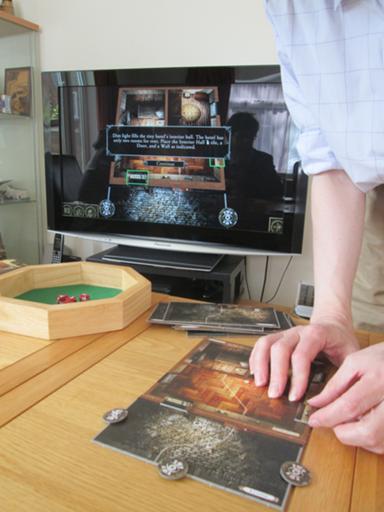
This scenario was "Escape from Innsmouth": the party had been sent
there on some minor matter of genealogical research, decided we didn't
like it, and now had to get away. We quickly started to find our way
to the docks.
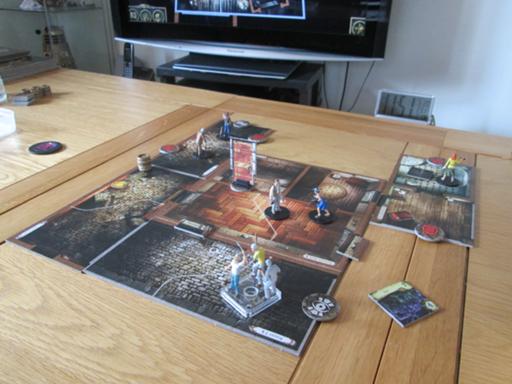
But, it turned out, we first had to complete various bits of research
or the boat out in the harbour wouldn't come in and pick us up. Still,
we could at least burn the place down.
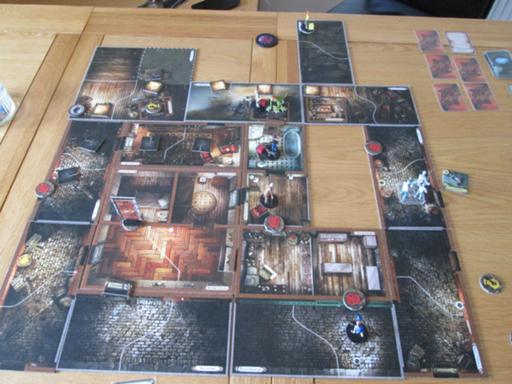
We failed, in the end, because we hadn't opened every single door, box
or puzzle in the exact right order. And I think that this is where
Fantasy Flight is trying, given the very limited scenario count, to
add replayability: given the turn limit there's no practical way to
succeed at this on your first play without being very lucky. I suspect
one could plot out the exact order in which to do things for a second
play (unless of course the app shuffles them around!), and probably
fail because it's quite a hard challenge even then, and maybe get a
victory on a third or fourth play. There could easily have been
variable difficulty levels in the app, but I suspect that having
beaten a scenario on "easy" one wouldn't be inclined to go back and
try again on "hard".
But that doesn't make it much fun on a first play, where we were at
the board for perhaps 5½-6 hours, and particularly once it became
clear that we weren't going to win (some five turns before the end)
the game did start to wear out its welcome with me.
Where one might have expected the app-based scenarios to be much more
flavourful than could be achieved with a few lines of tiny text on a
card, this one mostly reminded me of classic text adventures: take
item A to puzzle B, use it to get item C which needs to go to puzzle
D, except you'll discover them in the order B, D, A. This is a lock
you can try to pick, but that lock only opens with a key. Some
rigidity is probably inevitable in a mechanical GM, but it can be
better disguised. My real narrative problem was that, because we went
in an unexpected direction, we didn't get the mission goals that
should have been in the initial briefing ("gather the evidence and
then escape") - if we'd gone in a different direction at first, we'd
have known we had to complete three specific tasks, and we'd have had
a more solid structure to work with. Instead, we concentrated on
escaping since that was what the briefing had told us to do, got all
sorts of messages that made no particular sense out of context, and
then had to head back to look for evidence.
At the same time, some of the card text is distinctly ambiguous (just
how far can Ashcan Pete's dog carry items?) and sloppy.
It's not terrible, and the app wasn't as annoying as I'd expected (the
monster combat in particular was very well handled), but the
compromises made in the name of keeping the players interested when
new scenarios will clearly be expensive to buy (though I'm not really
sure why they should be, given the simplicity of the game engine) make
this one that I don't expect to go back to in a hurry.
Comments on this post are now closed. If you have particular grounds for adding a late comment, comment on a more recent post quoting the URL of this one.